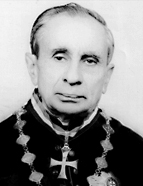

A master of several national archives, including the Arquino Nacional da Torre do Tombo [National Archive of the Tower of Tombo], the Public Library and District Archive of Braga, and the Archive of the University of Coimbra, his prolific research activity also took him abroad to archives and libraries in Paris, Barcelona (Archivo de la Corona de Aragón), Rome (Archivio Segreto Vaticano), Madrid (Archivo Histórico Nacional), and other locations across Spain. His scientific reputation led him to conferences in Boston and New York (VI International Colloquium of Luso-Brazilian Studies, 1966), Barcelona (V International Congress of Christian Archaeology, 1970), Budapest (IVe Congrès International de Diplomatique, 1973), Rome (XIV International Marian Congress, 1976), and Paris (Ve Congrès International de Diplomatique, 1977). His scholarly work, beginning with his doctoral thesis, gained recognition in some of the most prestigious foreign intellectual circles of his time, such as Analecta Bollandiana (LXXX, Brussels, 1962), Analecta Sacra Tarraconensia (XXXIV, Barcelona, 1961), Antonianum (XL, Rome, 1965), Bulletin des Études Portugaises (24, Lisbon, 1963), Compostellanum (VII, Santiago, 1962), Gregorianum (XLIII, Rome, 1962), Hispania. Revista Española de Historia (LXXXVII, Madrid, 1962), Hispania Sacra (XIV, Madrid, 1961), Revue d'Histoire Ecclésiastique (LVII, Louvain, 1962). His work was also featured in notable Portuguese journals such as Brotéria (LXXII, 1961), Itinerarium (VII, 1961), Lumen (XXV, 1961), and Lusitania Sacra (V, 1960/61).
AJC began teaching early in his career. After completing his theology degree, he taught at the Seminário de Nossa Senhora da Conceição in Braga and at the Seminário Conciliar de São Pedro e São Paulo, where he remained until 1943 and was remembered as a dedicated teacher. There, he taught a diverse range of subjects, including Geographical and Natural Sciences, Portuguese Literature (SNSC), Experimental Psychology, and History of the Church (SCSPSP). However, due to the circumstances of his life, the Faculdade de Letras da Universidade de Coimbra became the institution where he served most as a lecturer. Having started by teaching practical classes in Palaeography and Diplomatics, Epigraphy, and the History of the Middle Ages within the History degree course, as well as Palaeography Training in the Curso de Bibliotecário-Arquivista, he soon took on full responsibility for these subjects. He later added Archivology and Archiveconomics to his teaching load, and occasionally taught History of Christianity and Numismatics in the History degree programme. In 1966, in the absence of Dr Torquato Brochado de Sousa Soares, he assumed the chair of History of the Middle Ages and took over the direction of the Seminar in Medieval History of Portugal, followed by the Seminars in Specialisation Courses I and II in Economic and Social History.
